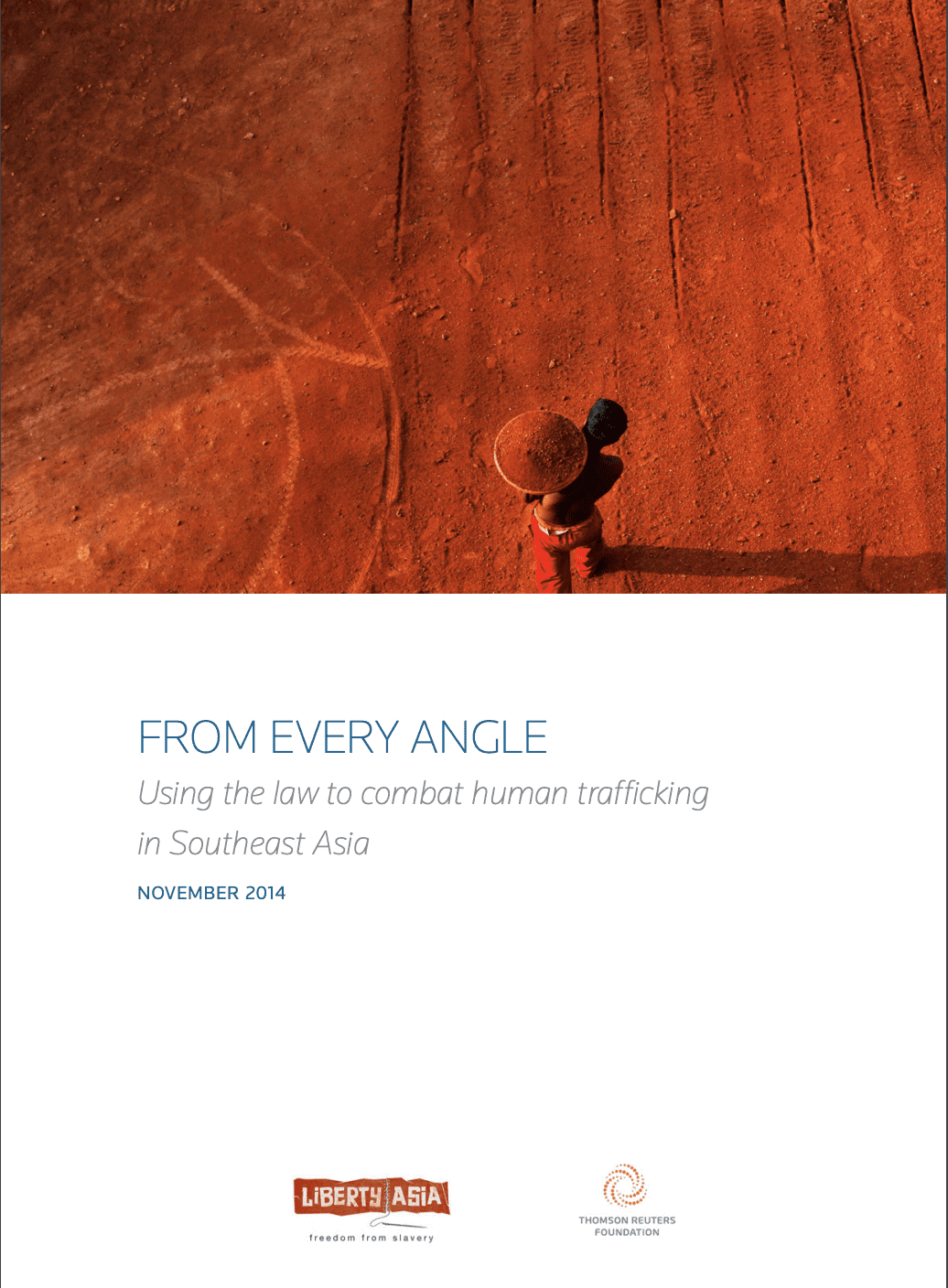
From Every Angle: Using the law to combat human trafficking in Southeast Asia
Introduction
With an estimated 21,000,000 slaves in the world and less than 10,000 reported prosecutions in 2013, much remains to be done to hold traffickers accountable for their actions and to secure justice for survivors of human slavery. One of the key challenges faced by the counter-trafficking movement is translating into practical terms the understanding of human trafficking as an ensemble of crimes and a process involving multiple parties and multiple jurisdictions. This Report considers a series of generic trafficking scenarios: sex trafficking, labour trafficking, construction trafficking, domestic trafficking and marriage trafficking and the various breaches of law that are triggered by different sets of facts in different jurisdictions across South-East Asia.
This Report highlights offences that include but are not limited to the offence of trafficking in persons, bribery/corruption, labour law violations, money-laundering offences, rape, theft, deception, assault, slavery and forced labour. The research paints a mixed picture with some jurisdictions, for example Thailand, armed with stronger legal frameworks than others but that in itself does not guarantee better prosecution and protection. Trafficking is gendered in some legal frameworks (e.g. China) whilst others are gender-neutral. The differences highlighted are primarily as a result of the differing notions/ definitions of human trafficking. The frameworks examined are heavily biased in favour of the offence of sex trafficking whilst forced labour attracts a fairly low sentencing tariff.
The aim of this Report is to allow front-line NGOs engaged in legal service provision and lawyers representing victims of trafficking to get creative about the way they pursue traffickers hence improving their chances of securing justice for victims. This Report is a tool that offers alternative avenues in a world where prosecutions for trafficking offences often fail due to paucity of evidence or an uncollaborative survivor who is fearful of the consequences of testifying against her traffickers. A broader view of the full spectrum of offences involved in various trafficking scenarios offers the opportunity to take a more holistic view of the crime and promote a more targeted response.
Thank you to all the regional partners involved in this project for their hard work and to Trust Law for bringing us together to complete this Report.
Executive Summary
- All jurisdictions examined in this piece of research have specific anti-trafficking legislation in addition to relevant provisions in their respective Criminal/Penal Codes. The breadth of the definition of trafficking varies. For example, Cambodia, Malaysia, Myanmar and Thailand are modeled on the 2000 UN protocol definition particularly in regard to the definition of exploitation. On the other hand, the Hong Kong definition of trafficking as set out in the Crimes Ordinance (Cap 200) is focused on cross-border sex trafficking for exploitation in prostitution whilst China’s definition of human trafficking excludes the application of sex trafficking laws to men.
- Malaysia, Thailand, China, Cambodia, Myanmar and Vietnam all criminalize forced labour whereas forced labour is not criminalized in Hong Kong. Punishment ranges from as light as a two-week detainment to 10 years imprisonment. Countries such as Thailand that recognize forced labour as a form of exploitation under anti-trafficking law generally promulgate higher punishment than those where forced labour is punishable under separate Labour law or Penal Code provisions.
- All jurisdictions offer similar worker protection laws e.g. number of working hours daily/weekly, failure to pay wages, failure to grant rest days, pay overtime work and grant sick leave. Punishment is mostly by way of fine with the exception of Thailand where the law prescribes imprisonment for a term not more than 6 months.
- Slavery is also punishable under separate Penal Code provisions in Thailand, Myanmar and Malaysia. The laws in all three jurisdictions refer to slavery similarly as the act of bringing into or sending out of the country, removing, buying, selling, disposing of or restraining any person.
- The degree of punishment for the crime of human trafficking varies with Myanmar prescribing the most stringent punishment up to a term of life imprisonment if the crime is committed on women and children. Factors that go into determination of appropriate punishment include, among others, purpose of trafficking, number of trafficked persons, how many times the trafficker has committed the crime and age of victims.
- Conspiracy to commit trafficking is an offence in Thailand and Myanmar. Under Thai law, conspirators receive no more than one-half of the punishment of the offenders whereas conspirators and offenders in Myanmar receive the same punishment.
Read more here.
